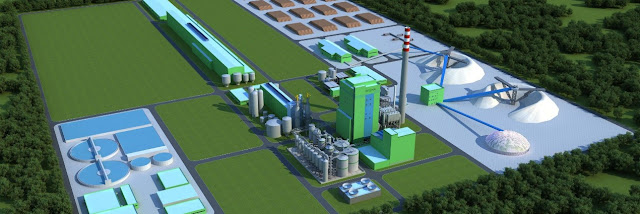Investors plan to build a 1 billion euros biorefinery in Estonia
Last week, a group of Estonian investors (see
the list at the end of the post) with a long-term forestry and wood industry
experience announced its intention of building a modern and environmentally
sound biorefinery in Estonia (see press
release). With an estimated quantity of 1 billion euro, it would be the
largest ever industry investment in Estonia.
Main data and facts about this project are
summarized in the following table:
Feedstocks and products
|
|
Feedstock
and processing capacity
|
Wood from
Estonia (also from Latvia or Lithuania if necessary): spruce, pine and birch.
Wood chips produced in sawmills.
3 Mm3
of pulpwood and wood chips.
|
Products
and production capacity
|
Market
pulp and other bioproducts made from cellulose, hemicellulose and lignin, including
green energy.
700,000
tons of pulp.
The plant
would constantly and stably produce 25% more renewable energy than its own use
for the production process.
|
Schedule
|
|
Environmental
impact study, applications for environmental permits, public discussions
|
Starting
in early 2017
|
Investment
decision and financing plan
|
2019
|
Biorefinery
construction, personnel recruitment, training
|
2020 -
2021
|
Start-up
|
2022
|
Location
|
|
Various
locations in different parts of Estonia are being analysed. Prerequisites: 100
hectares of land, close to raw materials, operating network of roads and rail,
access to a sustainable river water resource and local qualified labour
force.
|
|
Positive impact on the whole region’s forestry
sector as well as on the Estonian economy
|
|
Value
added created by the bioproducts mill
|
210 - 270
M€ (1-1,4 % GDP of Estonia in 2015)
|
Increase
of the Estonian export
|
250 - 350
M€ annually
|
Employment
|
200
qualified new direct jobs and in addition 500 – 700 new jobs in the value
chain servicing the mill
|
Figure 1. Model of the bioproducts mill (extracted
from www.biorefinery.ee)
Margus Kohava and Aadu Polli (recognized
forestry industry experts) lead the biorefinery project. Its feasibility is
being analysed in a close cooperation with various Estonian state authorities
as well as with well-known scientific experts. Margus Kohava accentuated that
the investors would like to have a close cooperation with the public. “It is
vital for us to constructively collaborate with all interest groups, scientific
communities and potential co-investors to ensure that the mill’s construction,
technology and operation would be in accordance with the environmental
requirements, be social-economically sustainable and in concord with the
interest of the Estonian society” he added.
The investors that initiated the research and
analysis stage of the project represent 100% Estonian capital. In case of a
positive investment decision, they plan to engage a financial investor and/or
strategic investor. It is expected that an international banks syndicate would
participate in financing the project. Another possibility is to receive money
from the local capital market. Considering the volume of construction works, it
is expected to have a foreign and local construction companies to form a
consortium for carrying out the civil construction works.
Investors:
- Aimar Varula
- Arvo Türner
- Heiki Vahermets
- Peedo Pihlak
- Toomas Mets and Virko Lepmets (OÜ Combiwood)
- Peeter Mänd (Ivard OÜ)
- Kaido Jõeleht (Kaamos Group)
- Jüri Külvik (Lemeks Grupp)
- Mati Polli (Tristafan OÜ)
- Tiit Nilson (Woodwell)
Advisors:
- Daniel Paalsson (international biorefinery
expert)
- Urmas Varblane (consultant of macroeconomic topics)
- Raidla Ellex (law office)
- Estonian Center for Applied Research CentAR
- Communication Consultancy JLP





